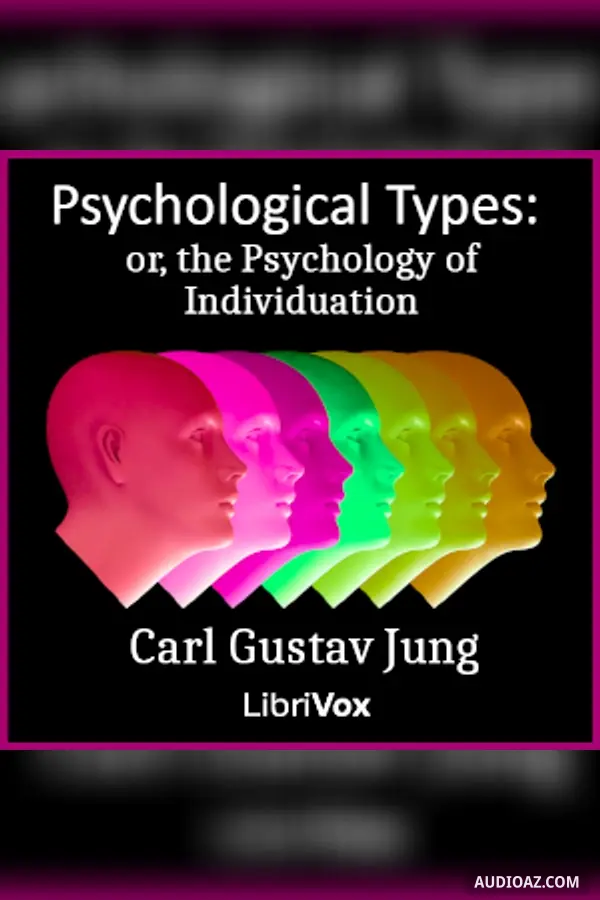
Psychological Types: Or, the Psychology of Individuation - Free Audiobook
Author(s): Carl Gustav Jung,
Language: English
1 / 77Translator's Preface
00:0000:00
77 Chapter(s)
- 1. Translator's Preface
- 2. Foreword
- 3. Introduction
- 4. Chapter 1 The Problem of Types in the History of Classical and Medieval Thought, 1: Psychology in the Classical Age: The Gnostics, Tertullian, and Origen
- 5. Chapter 1.2: The Theological Disputes of the Ancient Church
- 6. Chapter 1.3: The Problem of Transubstantiation
- 7. Chapter 1.4 Nominalism and Realism intro and (a) The Problem of the Universalia in the Classical Age
- 8. Chapter 1.4 (b): The Universalia Problem in Scholasticism
- 9. Chapter 1.4 (c): Abelard's Attempt at Conciliation
- 10. Chapter 1.5: The Holy Communion Controversy between Luther and Zwingli
- 11. Chapter 2 Schiller’s Ideas upon the Type Problem, 1: Letters on the Msthetic Education of Man, (a) The Superior and the Inferior Functions, Part 1
- 12. Chapter 2 Schiller’s Ideas upon the Type Problem, 1: Letters on the Msthetic Education of Man, (a) The Superior and the Inferior Functions, Part 2
- 13. Chapter 2.2: A Discussion on Naive and Sentimental Poetry
- 14. Chapter 3: The Apollonian and the Dionysian
- 15. Chapter 4 The Type Problem in the Discernment of Human Character, 1: General Remarks upon Jordan's Types
- 16. Chapter 4.2 Special Description and Criticism of the Jordan Types, (a) The Introverted Woman (the more-impassioned woman), and (b) The Extraverted Woman (the less-impassioned woman)
- 17. Chapter 4.2 Special Description and Criticism of the Jordan Types, (c) The Extraverted Man, and (d) The Introverted Man
- 18. Chapter 5 The Problem of Types in Poetry - Carl Spitteler’s Prometheus and Epimetheus, 1: Introductory Remarks on Spittelers Characterization of Types
- 19. Chapter 5.2: A Comparison of Spitteler’s with Goethe's Prometheus
- 20. Chapter 5.3 The Significance of the Reconciling Symbol
- 21. Chapter 5.3 (a) The Brahmanic Conception of the Problem of the Opposites
- 22. Chapter 5.3 (b) Concerning the Brahmanic Conception of the Reconciling Symbol
- 23. Chapter 5.3 (c) The Reconciling Symbol as the Principle of Dynamic Regulation
- 24. Chapter 5.3 (d) The Reconciling Symbol in Chinese Philosophy
- 25. Chapter 5.4 The Relativity of the Symbol (a) The Service of Woman and the Service of the Soul, Part 1
- 26. Chapter 5.4 (a) The Service of Woman and the Service of the Soul, Part 2
- 27. Chapter 5.4 (b) The Relativity of the Idea of God in Meister Eckehart, Part 1
- 28. Chapter 5.4 (b) The Relativity of the Idea of God in Meister Eckehart, Part 2
- 29. Chapter 5.5 The Nature of the Reconciling Symbol in Spitteler, Part 1
- 30. Chapter 5.5 The Nature of the Reconciling Symbol in Spitteler, Part 2
- 31. Chapter 6 The Type Problem in Psychiatry, Part 1
- 32. Chapter 6 The Type Problem in Psychiatry, Part 2
- 33. Chapter 7 The Problem of Typical Attitudes in Aesthetics, Part 1
- 34. Chapter 7 The Problem of Typical Attitudes in Aesthetics, Part 2
- 35. Chapter 8 The Problem of Types in Modern Philosophy, 1: William James' Types
- 36. Chapter 8.2: The Characteristic Pairs of Opposites in James' Types, Part 1
- 37. Chapter 8.2: The Characteristic Pairs of Opposites in James' Types, Part 2
- 38. Chapter 8.3: General Criticism of James' Conception
- 39. Chapter 9 The Type Problem in Biography, Part 1
- 40. Chapter 9 The Type Problem in Biography, Part 2
- 41. Chapter 10 General Description of the Types, A: Introduction
- 42. Chapter 10 B The Extraverted Type, (I) The General Attitude of Consciousness
- 43. Chapter 10 B (II) The Attitude of the Unconscious
- 44. Chapter 10 B (III) The Peculiarities of Basic Psychological Functions in the Extraverted Attitude, 1: Thinking
- 45. Chapter 10 B (III) 2: The Extraverted Thinking Type
- 46. Chapter 10 B (III) 3. Feeling, and 4. The Extraverted Feeling Type
- 47. Chapter 10 B (III) 5. Recapitulation of Extraverted Rational Types
- 48. Chapter 10 B (III) 6. Sensation, and 7. The Extraverted Sensation Type
- 49. Chapter 10 B (III) 8. Intuition, and 9. The Extraverted Intuitive Type
- 50. Chapter 10 B (III) 10: Recapitulation of Extraverted Irrational Types
- 51. Chapter 10 C The Introverted Type, (I) The General Attitude of Consciousness
- 52. Chapter 10 C (II) The Unconscious Attitude
- 53. Chapter 10 C (III) Peculiarities of the Basic Psychological Functions in the Introverted Attitude, 1: Thinking
- 54. Chapter 10 C (III) 2: The Introverted Thinking Type
- 55. Chapter 10 C (III) 3. Feeling, and 4. The Introverted Feeling Type
- 56. Chapter 10 C (III) 5. Recapitulation of Introverted Rational Types
- 57. Chapter 10 C (III) 6. Sensation, and 7. The Introverted Sensation Type
- 58. Chapter 10 C (III) 8. Intuition, 9. The Introverted Intuitive Type, and 10. Recapitulation of Introverted Irrational Types
- 59. Chapter 10 C (III) 11. The Principal and Auxiliary Functions
- 60. Chapter 11 Definitions, Part 1
- 61. Chapter 11 Definitions, Part 2
- 62. Chapter 11 Definitions, Part 3
- 63. Chapter 11 Definitions, Part 4
- 64. Chapter 11 Definitions, Part 5
- 65. Chapter 11 Definitions, Part 6
- 66. Chapter 11 Definitions, Part 7
- 67. Chapter 11 Definitions, Part 8
- 68. Chapter 11 Definitions, Part 9
- 69. Chapter 11 Definitions, Part 10
- 70. Chapter 11 Definitions, Part 11
- 71. Chapter 11 Definitions, Part 12
- 72. Chapter 11 Definitions, Part 13
- 73. Chapter 11 Definitions, Part 14
- 74. Chapter 11 Definitions, Part 15
- 75. Chapter 11 Definitions, Part 16
- 76. Chapter 11 Definitions, Part 17
- 77. Conclusion
About
Ever wondered if there is any "theoretical basis" for the well-known Myers–Briggs Type Indicator Personality Test? In this groundbreaking work of typology, Jung proposes three key dichotomies - extraversion/introversion, sensation/intuition, as well as thinking/feeling - as an attempt to reconcile the differing theories of Sigmund Freud and Alfred Adler. - Summary by Cao Yuqing
Comments
Related Audiobooks
Tags: Psychological Types: Or, the Psychology of Individuation audio, Psychological Types: Or, the Psychology of Individuation - Carl Gustav Jung audio, Non-fiction audio, Psychology audio, free audiobook, free audio book, audioaz






